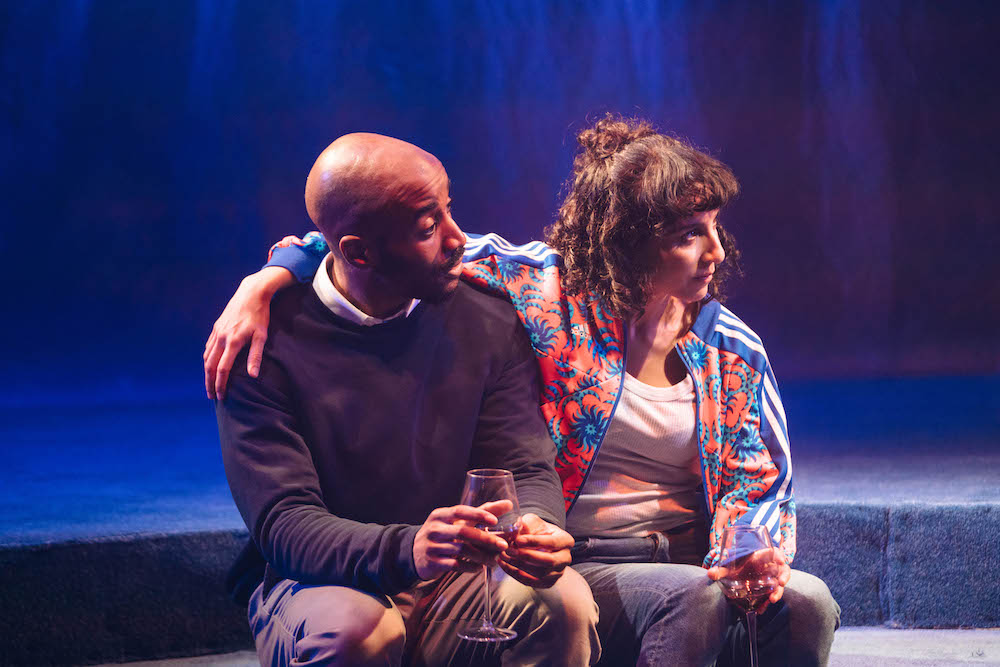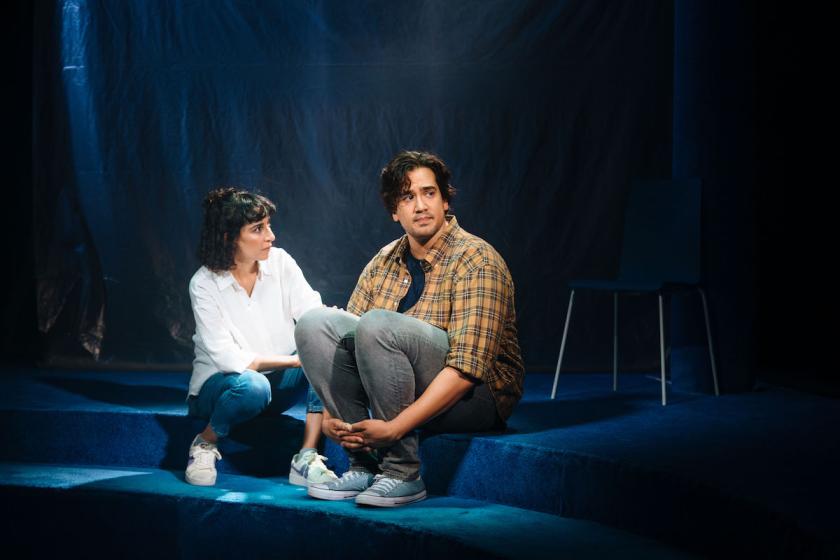Platonic love should be simple – basically you’re best mates. And without the complications of sex, what could go wrong? Waleed Akhtar, whose big hit The P Word was also performed here at the Bush, takes this idea and complicates it – by making it about a gay boy and a straight girl.
The playwright then adds further complications: family, ethnicity, religion, life chances and career choices. The result, which stars It’s a Sin’s Nathaniel Curtis as well as Mariam Haque, is a fascinating account of mixed emotions and a sad story about the gradual decay of youthful idealism. As such, it is definitely a play for our times.
Zaid (Curtis) and Neelam (Haque) are British Pakistani and have know each since school. At the age of 19, while at a club, high as kites and dancing to some fantastic sounds, they both experience an epiphany of love for each other. Yes, with a little help from some chemicals. How this memory plays out in their deep platonic relationship over the next two decades is the subject of Akhtar’s lively and moving drama. At first, both the queer guy and the straight young woman share all their experiences and their secrets. Both want to be writers; both gravitate to the theatre. But then it gets complicated: while Neelam gets a meeting with Jeremy, an older white director interested in a play about Muslims, Zaid is rejected.
As both Neelam and Zaid struggle with their writing (will she compromise her play to meet the demands of white audiences?), they both do poorly paid jobs to get by. Then while Zaid goes to university to study Computer Science, Neelam chooses to be a law student. Then love interests appear to further complicate their relationship: Zaid meets the older Jeremy and they begin an affair; Neelam meets Deji, a rising British-Nigerian lawyer. Both Zaid and Neelam are afraid of telling their Muslim parents about their lovers: Zaid can’t admit that he’s gay and Neelam know that her parents will reject Deji because of his skin colour, religion and heritage.
 As these difficulties multiply, Akhtar carefully examines the different emotional attachments of Zaid and Neelam, while also finding some room in the raher hurried two-hour running time for Jeremy, who is also a playwright, and Deji to express their own emotional needs. Although both of these characters are subsidiary to the main story, I do feel they could have had more space – especially towards the end when our platonic couple experiences the problems of what the text calls “first choice” and “second choice” friendships. But by the time that Neelam says that they were fine in the past because “Life hadn’t come for us yet”, you feel a really strong emotional charge.
As these difficulties multiply, Akhtar carefully examines the different emotional attachments of Zaid and Neelam, while also finding some room in the raher hurried two-hour running time for Jeremy, who is also a playwright, and Deji to express their own emotional needs. Although both of these characters are subsidiary to the main story, I do feel they could have had more space – especially towards the end when our platonic couple experiences the problems of what the text calls “first choice” and “second choice” friendships. But by the time that Neelam says that they were fine in the past because “Life hadn’t come for us yet”, you feel a really strong emotional charge.
While watching how the relationship between Zaid and Neelam changes over time gives us an investment in the play, and surely we are silently rooting for both of them, Akhtar also entertains us with dialogue that is both true to the emotions and often humorous in its depiction of the problems of stereotyping and having different beliefs. The pressures of family expectations, and the way that youthful ideals and ambitions are bruised on the anvil of reality, come across very strongly. The satirical material about British theatre’s powerful white men and their relationship to Asian stories is acute and timely. And, throughout the evening, the crucial memory scene of the epiphany in the nightclub is replayed with variations again and again.
This is one of those plays that makes you want to be a friend of the characters and help them stay connected when family problems, domesticity and other things push them apart. As it is, Zaid and Neelam are convincing creations whose feelings and actions are not only singular, but also common to us all. The play suggests that while we all might find some happiness and stability in a conventional relations with “the one”, this should not prevent us from having other close bonds. And that maybe the platonic love of the central couple is “the real one”, however ironic this title turns out to be.
Okay, so the last 30 minutes of The Real Ones does feel a bit wearisome, but I think this is because the emotions of the story have been pretty acute, and we have invested a lot in Zaid and Neelam. This is in a large part due to Anthony Simpson-Pike’s excellent production which uses designer Anisha Fields’s bare stage, with its sunken circular centre, to keep the pacing rapid and locations clear. The watchable cast is uniformly convincing, with Curtis starting off as a rather shy Zaid, then becoming much more confident and even disdainful. Simultaneously, Haque makes a parallel journey from youthful certainty to a more mature sense of being well grounded.
The sincerity of the acting is also evident in the two other roles: Anthony Howell’s Jeremy combines a certain privileged snootiness with a passionate need for success as a writer and as a lover, while Nnabiko Ejimofor’s Deji (pictured above with Haque) successfully communicates both the character’s confidence and his vulnerability. In fact, all the characters embody strength of purpose with sensitivity. Although this is not a perfect play, I find it engrossing, enjoyable and thought-provoking. Rather than the thumping club scenes, with their classic dance soundtrack, it’s the quietly intense passages that work the best. In fact, The Real Ones is a quietly inspiring piece of new writing.















Add comment